牛津译林七年级下册英语知识点汇总
牛津译林版七年级下英语知识点总结

牛津译林版七年级下英语知识点总结1."Would you like to do something?"Positive answer: "Yes。
I'd/we'd like/love to."Negative answer: "I'd/we'd like/love to。
but。
" or "Sorry。
I'm/We're afraid not."2."Next to" means near or beside.3."One" refers to any one of the same type of thing ned earlier。
"It" refers to the same thing ned earlier.4."Be from" means to come from.5."The capital of" refers to the capital or provincial capital ofa place.6."Around the world," "in the world," and "all over the world" all mean globally.7."Enjoy oneself," "have a good time," and "have fun doing something" all mean to have a good experience doing something.8."In the centre of" means in the middle of.9."Share something with someone" means to use or enjoy something together.10."Look out" means to look outside。
(完整word)译林版牛津英语七年级下册全册Unites1-8单元知识点及语法归纳,推荐文档
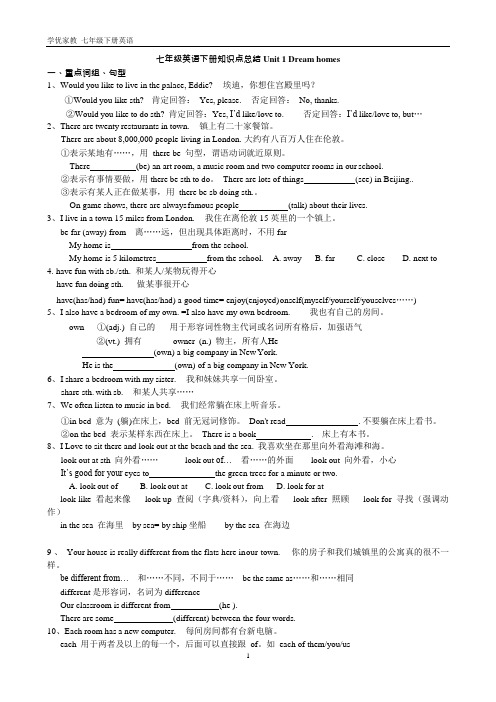
七年级英语下册知识点总结Unit 1 Dream homes一、重点词组、句型1、Would you like to live in the palace, Eddie? 埃迪,你想住宫殿里吗?①Would you like sth? 肯定回答:Yes, please. 否定回答:No, thanks.②Would you like to do sth? 肯定回答:Yes, I’d like/love to. 否定回答:I’d like/love to, but…2、There are twenty restaurants in town. 镇上有二十家餐馆。
There are about 8,000,000 people living in London. 大约有八百万人住在伦敦。
①表示某地有……,用there be 句型,谓语动词就近原则。
There (be) an art room, a music room and two computer rooms in our school.②表示有事情要做,用there be sth to do。
There are lots of things (see) in Beijing..③表示有某人正在做某事,用there be sb doing sth.。
On game shows, there are always famous people (talk) about their lives.3、I live in a town 15 miles from London. 我住在离伦敦15 英里的一个镇上。
be far (away) from 离……远,但出现具体距离时,不用farMy home is from the school.My home is 5 kilometres from the school. A. away B. far C. close D. next to 4.have fun with sb./sth.和某人/某物玩得开心have fun doing sth. 做某事很开心have(has/had) fun= have(has/had) a good time= enjoy(enjoyed) o nself(myself/yourself/youselves……)5、I also have a bedroom of my own. =I also have my own bedroom. 我也有自己的房间。
牛津译林版七年级下英语知识点总结

7BUnit1 Dream homes1、Would you like to do sth...?肯定回答:Yes, I’d/We’d like/love to否定回答:I’d/We’d like/love to,but...或Sorry,I’m/We’re afraid not...2、next to =near紧邻,在......近旁3、one泛指上文提及的同类事物中的一个。
It特指上文提到的同一个事物4、be from = come from来自5、the capital of......的首都/省会6、around the world = in the world = all over the world在全世界7、enjoy oneself = have a good time = have fun doing sth做某事很开心8、in the centre of在......的中心9、share sth with sb = share sb sth与某人合用/分享某物10、look out向外看look out at sth向外看某物look out of向......外看11、have a lot of things to do I have a lot of homework to do.12、foot复数形式为feet13、have an area of占......面积14、over = more than超过15、There be +,名词+ v-ing+地点状语There is a baby sleeping in the room.16、be full of = be filled with满是......,充满......17、of one’s own属于某人自己的on one’s own单独地;独立18、hope to do sth hope sb will/can do sth没有hope sb to do sth19、some day将来的某一天,总有一天20、常用的电话用语:Who's speaking,please?请问你是哪位?Is that ... ( speaking)?你是......吗?This is ... ( speaking).我是......May I speak to..?.我能和....通电话吗?21、take a message传个话22、ask sb. (not) to do sth.要求某人(不要)做某事23、call sb back给某人回电话24、double adj双的,两倍的25、one of +名词复数26、at the foot of在......脚下27、in front of在...外部的前面in the front of在...内部的前面28、on the ground floor在一楼29、more than多于less than少于30、invite sb(not)to do sth邀请某人(不要)做某事invite sb to some place邀请某人去某地31、each of us = we each我们每个人32、in town在城里33、a cup of tea一杯茶34、living room客厅dining room餐厅35、washing machine洗衣机36、a football field一个足球场37、have parties举行聚会38、more than enough足够多,太多39、in bed躺在床上in the bed在床上40、square metre平方米41、the best place to chat and watch TV聊天和看电视最好的地方42、home cinema家庭影院43、(be)different from与...不同反: (be ) the same as...与......相同44、a swimming pool游泳池45、at the weekend = on weekends在周末46、listen to sth.听某事物47、like sth best最喜欢某物48、live in..住在....49、after dinner晚饭后50、watch TV看电视51、chat with sb.和某人聊天52、in size在尺寸上53、telephone number电话号码54、love to do sth.love doing sth.喜爱做某事55、I like to do sth.like doing sth.喜欢做某事56、would like to do sth.愿意做某事would like sb. to do sth.想要某人做某事57、Thanks for doing sth.=Thank you for doing sth.感谢你做某事。
牛津译林版七年级英语下册Unit1-4知识点总结

牛津译林版七年级英语下册Unit1-4知识点总结1:would you like to do something:带有委婉的语气,可以用来征求意见,提出建议或者是发出邀请,回答是:肯定:yes,I’d love to 否定:I’d love to ,but i 2share something with sb. 3of one’s own属于某人自己的4more than enough :足够多,太多5.基数词和序数词Ⅰ基数词用来谈论数量的多少序数词谈论日期,楼层,位置Ⅱ百千及以上数字的读法Ⅲ序数词的构成主要词组和语法dream adj. my dream home 我理想的家n. In his dream, he saw a golden cloud. 他在梦中看到了一朵金色的云。
v. dream about/of sth dream about/of doing sth⑴You like to dream about everything.2. capital n. 首都the capital n. 资金the capital of doing sthn. 大写(字母)the capital letters beach n. 海滨( pl.) beacheson the beach 4. by sea = by ship乘船 5. child (pl.) childrenChildren’s Day is on June 1. 6. while conj 当... ...的时候(后接延续性动词或表状态的词)prep while + doingYou might be a bit disturbed while watching the programme.share sth. with sb. 和某人分享某物be friendly to/towards… 对……友好grow/grew/grown grow up长大grow flowers/vegetables种花/菜grow into长成grow up to 增长到grown-ups = adults 成人quiet adj.安静的quietly adv.安静地rain It often rains in our hometown. (vi.)= There is plenty of rain in our hometown. (n.) more than = over 超过/多于There is more than an/one attacker.Millie lives two floors above/below Tom. 米丽比汤姆住高/低两层.above the bed (不是垂直)over the river (垂直关系)under 是on和over 的反义词below 是above 的反义词several thousand students =several thousands of students.ten hundred/thousand/million women doctors 1000/10000/10000000个女医生我迫不及待地想见到你I can’t wait for the show..I can’t wait to see you.Don’t worry/ be worried about sth/(not) doing sth.My new telephone number is 55572118. What’s your new telephone number?我有空将给你打电话。
(牛津译林)英语7年级下册U6知识点
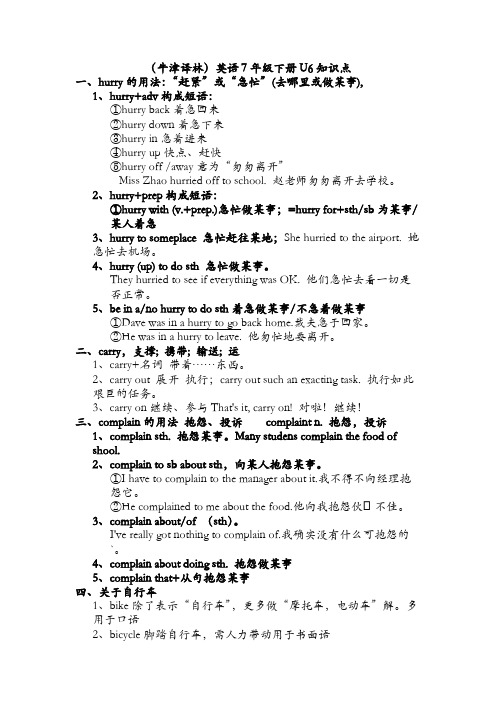
(牛津译林)英语7年级下册U6知识点一、hurry的用法:“赶紧”或“急忙”(去哪里或做某事),1、hurry+adv构成短语:①hurry back着急回来②hurry down着急下来③hurry in急着进来④hurry up快点、赶快⑤hurry off /away意为“匆匆离开”Miss Zhao hurried off to school. 赵老师匆匆离开去学校。
2、hurry+prep构成短语:①hurry with (v.+prep.)急忙做某事;=hurry for+sth/sb为某事/某人着急3、hurry to someplace 急忙赶往某地;She hurried to the airport. 她急忙去机场。
4、hurry (up) to do sth 急忙做某事。
They hurried to see if everything was OK. 他们急忙去看一切是否正常。
5、be in a/no hurry to do sth着急做某事/不急着做某事①Dave was in a hurry to go back home.戴夫急于回家。
②He was in a hurry to leave. 他匆忙地要离开。
二、carry,支撑; 携带; 输送; 运1、carry+名词带着……东西。
2、carry out 展开执行;carry out such an exacting task. 执行如此艰巨的任务。
3、carry on继续、参与That's it, carry on! 对啦!继续!三、complain的用法抱怨、投诉complaint n. 抱怨,投诉1、complain sth. 抱怨某事。
Many studens complain the food ofshool.2、complain to sb about sth,向某人抱怨某事。
①I have to complain to the manager about it.我不得不向经理抱怨它。
牛津译林版七年级下英语知识点总结

7BUnit1 Dream homes1、Would you like to do sth...?肯定回答:Yes, I’d/We’d like/love to否定回答:I’d/We’d like/love to,but...或Sorry,I’m/We’re afraid not...2、next to =near 紧邻,在......近旁3、one 泛指上文提及的同类事物中的一个。
It 特指上文提到的同一个事物4、be from = come from 来自5、the capital of ......的首都/省会6、around the world = in the world = all over the world 在全世界7、enjoy oneself = have a good time = have fun doing sth 做某事很开心8、in the centre of 在......的中心9、share sth with sb = share sb sth 与某人合用/分享某物10、look out向外看look out at sth 向外看某物look out of 向......外看11、have a lot of things to do I have a lot of homework to do.12、foot 复数形式为feet13、have an area of 占......面积14、over = more than 超过15、There be +,名词+ v-ing+地点状语There is a baby sleeping in the room.16、be full of = be filled with 满是......,充满......17、of one’s own 属于某人自己的on one’s own 单独地;独立18、hope to do sth hope sb will/can do sth没有hope sb to do sth19、some day 将来的某一天,总有一天20、常用的电话用语:Who's speaking,please?请问你是哪位? Is that ... ( speaking)?你是......吗?This is ... ( speaking).我是...... May I speak to..?.我能和....通电话吗?21、take a message 传个话22、ask sb. (not) to do sth. 要求某人(不要)做某事23、call sb back 给某人回电话24、double adj 双的,两倍的25、one of +名词复数26、at the foot of 在......脚下27、in front of 在...外部的前面in the front of 在...内部的前面28、on the ground floor 在一楼29、more than 多于less than 少于30、invite sb(not)to do sth邀请某人(不要)做某事invite sb to some place邀请某人去某地31、each of us = we each 我们每个人32、in town在城里33、a cup of tea一杯茶34、living room客厅dining room餐厅35、washing machine洗衣机36、a football field 一个足球场37、have parties 举行聚会38、more than enough足够多,太多39、in bed躺在床上in the bed在床上40、square metre平方米41、the best place to chat and watch TV 聊天和看电视最好的地方42、home cinema家庭影院43、(be)different from 与...不同反: (be ) the same as... 与......相同44、a swimming pool 游泳池45、at the weekend = on weekends在周末46、listen to sth.听某事物47、like sth best最喜欢某物48、live in.. 住在....49、after dinner晚饭后50、watch TV看电视51、chat with sb.和某人聊天52、in size在尺寸上53、telephone number电话号码54、love to do sth. love doing sth. 喜爱做某事55、I like to do sth. like doing sth. 喜欢做某事56、would like to do sth.愿意做某事would like sb. to do sth.想要某人做某事57、Thanks for doing sth.=Thank you for doing sth. 感谢你做某事。
牛津译林英语七年级下册全册知识点汇总
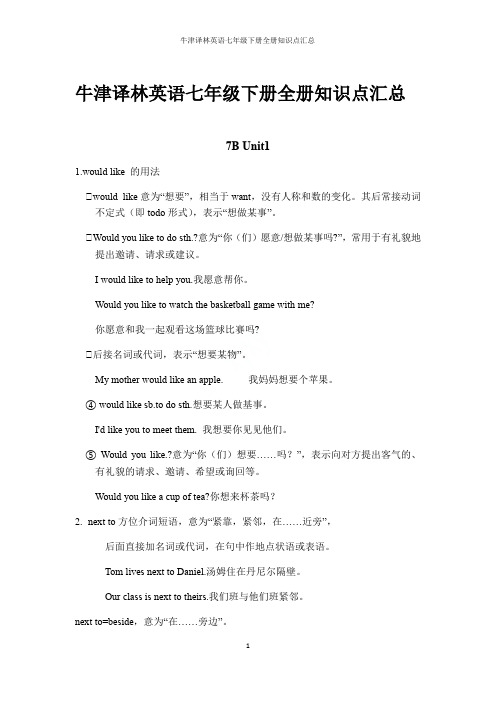
牛津译林英语七年级下册全册知识点汇总7B Unit11.would like 的用法①would like意为“想要”,相当于want,没有人称和数的变化。
其后常接动词不定式(即todo形式),表示“想做某事”。
①Would you like to do sth.?意为“你(们)愿意/想做某事吗?”,常用于有礼貌地提出邀请、请求或建议。
I would like to help you.我愿意帮你。
Would you like to watch the basketball game with me?你愿意和我一起观看这场篮球比赛吗?①后接名词或代词,表示“想要某物”。
My mother would like an apple. 我妈妈想要个苹果。
④ would like sb.to do sth.想要某人做基事。
I'd like you to meet them. 我想要你见见他们。
⑤Would you like.?意为“你(们)想要……吗?”,表示向对方提出客气的、有礼貌的请求、邀请、希望或询回等。
Would you like a cup of tea?你想来杯茶吗?2.next to方位介词短语,意为“紧靠,紧邻,在……近旁”,后面直接加名词或代词,在句中作地点状语或表语。
Tom lives next to Daniel.汤姆住在丹尼尔隔壁。
Our class is next to theirs.我们班与他们班紧邻。
next to=beside,意为“在……旁边”。
My home is next to our school.=My home is beside our school.我家靠近我们的学校。
3.in town 在城里,在镇上in the town 在这座城里,the 表示特指4.Your watch is very beautiful.I want to buy one,too. 你的手表很漂亮,我也想买一块。
新牛津译林版七年级下册知识点汇总

七年级英语下册知识点总结Unit 1 Dream homes一、重点词组、句型1、Would you like to live in the palace, Eddie? 埃迪,你想住宫殿里吗?①Would you like sth? 肯定回答:Yes, please. 否定回答:No, thanks.②Would you like to do sth? 肯定回答:Yes, I’d like/love to. 否定回答:I’d like/love to, but,2、There are twenty restaurants in town. 镇上有二十家餐馆。
There are about 8,000,000 people living in London. 大约有八百万人住在伦敦。
①表示某地有,,,用there be 句型,谓语动词就近原则。
There __________(be) an art room, a music room and two computer rooms in our school.②表示有事情要做,用there be sth to do。
There are lots of things ___________(see) in Beijing..③表示有某人正在做某事,用there be sb doing sth.。
On game shows, there are always famous people___________(talk) about their lives.3、I live in a town 15 miles from London. 我住在离伦敦15英里的一个镇上。
be far (away) from 离,,远,但出现具体距离时,不用farMy home is __________________from the school.My home is 5 kilometres ___________from the school. A. away B. far C. close D. next to 4. have fun with sb./sth. 和某人/某物玩得开心have fun doing sth. 做某事很开心have(has/had) fun= have(has/had) a good time= enjoy(enjoyed) onself(myself/yourself/youselves,,)5、I also have a bedroom of my own. =I also have my own bedroom. 我也有自己的房间。
牛津译林版七年级下册英语Unit1-Unit8各单元语法知识点复习提纲详细版(全面,实用!)
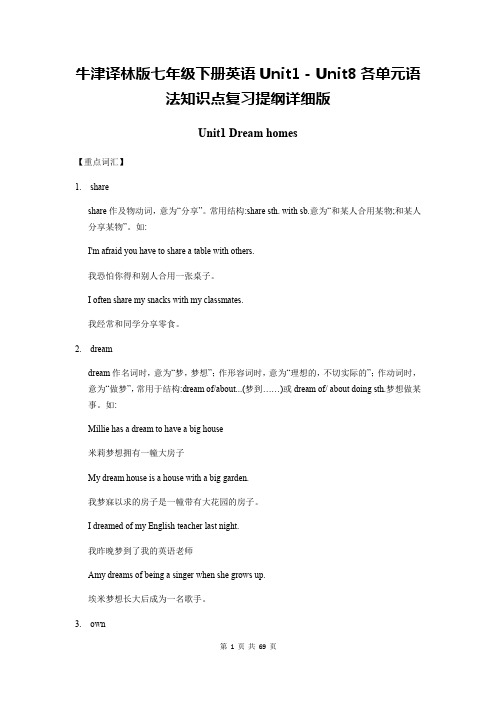
牛津译林版七年级下册英语Unit1-Unit8各单元语法知识点复习提纲详细版Unit1 Dream homes【重点词汇】1. shareshare作及物动词,意为“分享”。
常用结构:share sth. with sb.意为“和某人合用某物;和某人分享某物”。
如:I'm afraid you have to share a table with others.我恐怕你得和别人合用一张桌子。
I often share my snacks with my classmates.我经常和同学分享零食。
2. dreamdream作名词时,意为“梦,梦想”;作形容词时,意为“理想的,不切实际的”;作动词时,意为“做梦”,常用于结构:dream of/about...(梦到……)或dream of/ about doing sth.梦想做某事。
如:Millie has a dream to have a big house米莉梦想拥有一幢大房子My dream house is a house with a big garden.我梦寐以求的房子是一幢带有大花园的房子。
I dreamed of my English teacher last night.我昨晚梦到了我的英语老师Amy dreams of being a singer when she grows up.埃米梦想长大后成为一名歌手。
3. ownown作形容词.意为“自己的,属于自己的”,常和形容词性物主代词连用,构成短语of one's own,表示“属于某人自己的”,on one's own = alone,意为“独自地”。
own作动词时,表示“拥有”。
如:I have my own computer我有属于我自己的电脑。
That's a car of her own.那是她自己的汽车。
He lives on his own.他一个人生活。
牛津译林版英语七年级下册 Unit 7 Abilities 知识点

7BU7识点1.different abilities2.believe it or not3.look out=be careful.Look out of the windowLook out at the beaches.4.give a seat to someone on the bus.5.send some clothes to the children in poor areas.6.evenbetter/much bigger.7.He’s able to sing=He can sing.He will be able to sing.He was able to sing8.He paid 3 yuan for the book.He spent 3 yuan on the book,The book coat him 3 yuan.He paid for the lost book.9.take a notebook with you.10.raise money for them.11.It’s brave of him to help the people from the fire.12.There’s too much smoke.13.next door14.He’s badly ill/She’d badly hurt.15.He could play football=He was able to play football.16.rush into/rush out out of the room.17.some firemen put out the fire.18pour water over his coat to protect himself.19.Fire burnt his necks and arms20.He’s ill in hospital.He works in the hospital.21.at the moment now/at that moment.22.nodded/hurt/made/saw/heard23.be careful.He did his homework carefully.(carelessly)24.What good news!What a good news report!25.read newspapers at breakfast.26.It’s dangerous to play with matches.27.by the way/on theway home.28.Can you help me?No problem.,29.this term/last term30.How hard he works!31.do/try my best to do sth.32.play the piano/violin.33.He does well in English.He is good at English.34.He could sing at the age of six .(When he was six).35.show me some picture/some pictures to me36..take part in these activities/join the club.37.He lost his way last week.He heard from his father.=He got a letter from his father.38.collect things for Project Hope.39.visit an old people’s home.40.What a brave man!How brave the man is!41.He was brave enough to save his neighbour from a fire.42.He was at home alone=He was at home by himself.43.Listen!We can hear him singing a song.We often hear him sing songs.44.an 80-year-old woman/The woman is 80 years old.45.help her out.46.a little afraid/a little milk.,47.He didn’t have time to think about it.48.We should be careful with it.49.There is nothing to do.There is a girl reading a poemover there.50.Don’t put anything hot into the rubbish bin.51.keep your hair away from fire.52.Could I smoke here?Sorry,I’m afraid you can’t.53.burn things with eyes.54.He can hear things far away.55.He can fly as fast light.56.She needs to read more and speak more.58.practise playing volleyball.。
牛津译林版七年级英语下册全册重点知识点汇总
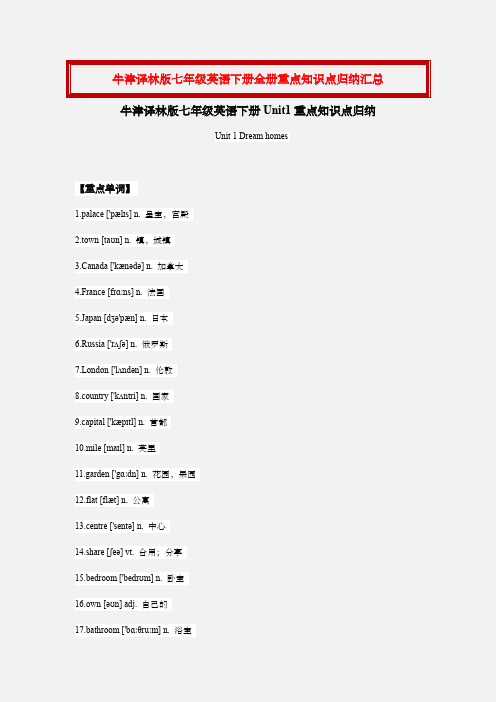
牛津译林版七年级英语下册全册重点知识点归纳汇总牛津译林版七年级英语下册Unit1重点知识点归纳Unit 1 Dream homes【重点单词】1.palace ['pælɪs] n. 皇室,宫殿2.town [taʊn] n. 镇,城镇3.Canada ['kænədə] n. 加拿大4.France [frɑːns] n. 法国5.Japan [dʒə'pæn] n. 日本6.Russia ['rʌʃə] n. 俄罗斯7.London ['lʌndən] n. 伦敦8.country ['kʌntri] n. 国家9.capital ['kæpɪtl] n. 首都e [maɪl] n. 英里11.garden ['gɑːdn] n. 花园,果园12.flat [flæt] n. 公寓13.centre ['sentə] n. 中心14.share [ʃeə] vt. 合用;分享15.bedroom ['bedrʊm] n. 卧室16.own [əʊn] adj. 自己的17.bathroom ['bɑːθruːm] n. 浴室18.balcony ['bælkəni] n. 阳台19.beach [biːtʃ] n. 海滩20.sea [siː] n. 海21.zero ['zɪərəʊ] num. 零22.hundred ['hʌndrəd] num. 百23.thousand ['θaʊzənd] num. 千lion ['mɪljən] num. 百万25.foot [fʊt] n. (pl. feet) 英尺26.square [skweə] adj. 平方的27.metre ['miːtə] n. 米,公尺28.area ['eərɪə] n. 面积29.over ['əʊvə] prep. 超过30.fork [fɔːk] n. 餐叉31.fridge [frɪdʒ] n. 冰箱32.knife [naɪf] n. (pl. knives)刀mp [læmp] n. 灯;台灯34.shower ['ʃaʊə] n. 淋浴35.sofa ['səʊfə] n. 沙发36.video ['vɪdɪəʊ] n. 录像37.may [meɪ] modal v. 可以;也许,可能38.message ['mesɪdʒ] n. 消息,音信39.double ['dʌbl] adj. 双的;两倍的40.study ['stʌdi] n. 书房41.machine [mə'ʃiːn] n. 机器42.field [fiːld] n. 田,地43.invite [ɪn'vaɪt] vt. 邀请44.stay [steɪ] vi. 停留,逗留【重点短语】1.be full of 充满2.of one’s own 某人自己的3.some day 某天4.take a message 传口信5.call sb. back 给某人回电话6.football field 足球场7.at the foot of 在……脚下8.washing machine 洗衣机9.dream homes 梦想家园10.live next to the restaurant 住在饭店隔壁11.the capital of Japan 日本的首都12.in the town/the city/the country 在镇上/市里/农村13.three students from different countries 来自不同国家的三个学生14.a flat in the center of Moscow 莫斯科中心的一套公寓15.have fun with my dog 和我的狗玩得高兴16.have fun (in) doing sth. 做某事很愉快17.share a bedroom with sb. 与某人共享一个卧室18.have my own room 有我自己的房间19.look out at the beach 眺望海滩20.cook meals 煮饭21.have an area of… 有……的面积22.make a video 制作一个视频23.send sb. sth. 把某物寄送给某人24.invite sb. to do sth. 邀请某人去做某事25.more than enough food 绰绰有余的食物【重点句型】1.Would you like to live in a palace?你愿意住在一个宫殿里吗?2.The capital of Japan is Tokyo.日本的首都是东京。
新牛津译林版英语七年级下册重点语法知识

七年级英语语法重点知识1. 一般现在时:表示表示通常性、规律性、习惯性的状态或者动作(有时间规律发生的事件)的一种时间状态。
在一般现在时中,当动词是实义动词,主语是第三人称单数时,谓语动词要用第三人称单数形式,即常在动词原形后加-s或-es。
第三人称单数构成规则(1)大多数动词直接加s (2) 以辅音字母加y结尾,去y加ies (3) 以s\x\ch\sh结尾加es (4) 以o结尾部分加es (5)have 的三单是has一般现在时做题规则:(1)一看是否有be(am\is\are),肯定句直接用am\is\are, 我用am,你、我们、你们、他们都用are, is用于他、她、它。
否定句be(am\is\are)后加not.一般疑问句一、二人称要互换,我换你,我的换你的,我们换你们,我们的换你们的,Be(am\is\are)移动到句首。
(2)二看实意动词分两类:一类非三单肯定句实意动词用原形,否定动词原形前加个don’t,一般疑问句一、二人称要互换,我换你,我的换你的,我们换你们,我们的换你们的,句首加个do。
(3)二类是三单包括她、他、它,XX。
三单肯定句实意动词用V-s\es, 三单否定句动词前面加doesn’t,动词必须回到用原形,一般疑问句一、二人称要互换,我换你,我的换你的,我们换你们,我们的换你们的,句首加个does, 动词必须回到用原形。
2. 现在进行时表示说话时正在进行的动作;表示现阶段正在进行着的动作但不一定是说话时正在进行。
常和now连用,有时用一个动词如look(看)、listen(听)来表示now(现在)这一时间概念。
常和at present(目前)、this week(本周)、these days(这几天)等时间状语连用。
现在进行时肯定句am\is\are+V-ing, 否定句am\is\are+not+V-ing,一般疑问句一般疑问句一、二人称要互换,我换你,我的换你的,我们换你们,我们的换你们的,Be(am\is\are)移动到句首。
+Unit+4+Finding+your+way+知识点汇总 牛津译林版七年级英语下册

7BUnit4 Finding your way 知识点汇总一、Comic strip and Welcome to the unit.1. follow me 跟我来【=come with me】【拓展】following 形容词:接下来的、以下的the following week = the next week 下一周2. Are you sure?你确定吗?【复习】be sure 用法:(1)be sure of/about sth. (2)be sure to do sth.(3)be sure +(that)宾从3.Let's go on a trip. 让我们去旅行。
【重点】go on a trip to sp. = travel to sp. = go to sp. for a trip 去某地旅行4.have to go up again 不得不再上去5.Sunshine Zoo is north of Sunshine Middle School.【重点】表示“A在B的东/南/西/北面"用句型:A is east/south/west/north of B其同义句是(另一种表达方式):A is to/on the east/south/west/north of BEg: Nanjing is west of Shanghai=Nanjing is to the west of Shanghai表示方位的介词in.on与to的区别:(1)in 表示A在B的范围之内,Jiangsuis in_the south ofChina.江苏在中国南部。
(2)to 表示两者不接壤,在范围以外,不是从属关系:Japanis to the east ofChina. 日本在中国东面.(3)on 表示两地接壤,在范围以外,不是从属关系:Russia is on the north ofChina. 俄罗斯在中国北面。
牛津译林版七年级英语下册Unit1知识点归纳

牛津译林版七年级英语下册Unit1知识点归纳<重要短语>1.live in a palace 住在一个宫殿里2.the capital of.. .的首都3. share sth. with sb.与某人合用/分享某物4.in size 在尺寸上5. be full of 满是6. some day 将来有一天,总有一天7. call sb. back 回电话8.next to 紧邻,在...近旁9. in the centre of 在...的中心10.look out at 向外眺望11.be different from 与...与众不同12. of one’s own 属于某人自己的13.take a message 传个话,捎个口信14.at the foot of 在...的脚下<重要句型>1.--Would you like to live in a palace, Eddie?埃迪,你想住宫殿吗?--No. I’d like to live ne xt to a restaurant.不。
我想住在饭店旁边。
2.Is Tokyo the capital of Japan ?东京是日本的首都吗?3.I always have fun with my dog there.我总是和我的狗在那里玩得很开心。
4.I share a bedroom with my sister.我和妹妹同住一间卧室。
5.I love to sit there and look out at the beach and the sea. 我喜欢坐在那儿,向外眺望海滩和大海。
6.Hello. May I speak to Daniel, please?您好。
我可以和丹尼尔通电话吗?7.--Who is speaking, please? 请问你是谁?--This is Simon. 我是西蒙。
2022-2023学年牛津译林版英语七年级下册全册知识点整理

Unit1Dream homes1、Would you like to live in a palace, Eddie艾迪,你想住在宫殿里吗这里 would like是“想,想要”的意思,后面可以加名词或动词或动词不定式。
如:I’d like to go to the USA next year. 明年我想去美国。
2、I’d like to live next to a restaurant. 我想住在餐馆附近。
这里next to 是“附近,靠近的”的意思,相当于near。
如:The table is next to the window. 这张桌子在窗户旁。
3、Which country is this photo from, Amy艾米,这幅照片来自哪个国家这里be from 相当于come from, 是“来自……”的意思。
如:Where is Mr Black from 布莱克先生来自于哪儿4、Is Tokyo the capital of Japan东京是日本的首都吗句型结构为:The capital of +国家is +首都。
如:The capital of the UK is London. 英国首都是伦敦。
[拓展](1)capital n.省会The capital of Jiangsu is Nanjing. 江苏省会是南京。
(2)capital n.大写字母We should write in a capital at the beginning of a sentence. 句子的开头我们应该用大写字母。
(3)capital n.资本,资金,资产personal capital 个人资产(4)capital adj.顶好的,一流的He came up with a capital idea. 他想好一个绝妙的主意。
5、I like the kitchen best. 我最喜欢厨房。
